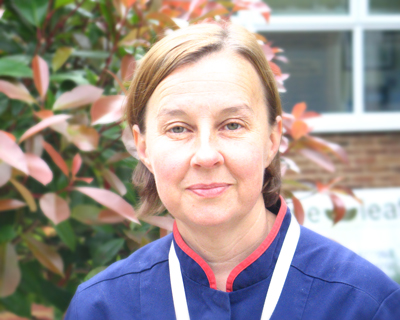 Helen Doyle is the matron of the transplant unit at Harefield Hospital. She oversees the two transplant wards, Rowan and Fir Tree, which provide care for patients throughout all stages of their transplant journey.
Helen Doyle is the matron of the transplant unit at Harefield Hospital. She oversees the two transplant wards, Rowan and Fir Tree, which provide care for patients throughout all stages of their transplant journey.
How did you get into nursing?
When I was 10 years old I decided I wanted to be a nurse and after that, I never considered anything else. As a child, I had a nurse dressing-up outfit and kit, which I loved playing with, and helping people just really appealed to me. As soon as I turned 18 I started training. I’ve now been at Harefield Hospital for 13 years and I have always worked in the transplant unit – first as a senior staff nurse, then a ward sister and I have held the position of matron since September 2014.
Can you describe the work of the transplant unit and the team you work with?
The transplant unit consists of two wards, Rowan and Fir Tree, and a ten-bedded high-dependency unit. We look after patients at all stages of their transplant journey: assessments before and after they have a transplant; after they leave the intensive therapy unit; if they have any post-transplant problems; and after they are fitted with a total artificial heart or a ventricular assist device.
The team is made up of dedicated nurses, some of whom have worked on the unit for more than 20 years in various roles, meaning they are all experts in their field. Junior nurses joining the unit are nurtured and professional development is actively encouraged. The nursing team is focused on providing a smooth patient journey and will always go the extra mile for patients.
What does a typical day involve for you?
I don’t think there is a typical day! I always make sure I spend part of each day on the wards, talking to the patients to find out about and resolve any issues before they turn into problems, and making sure they are happy. This information is also fed back to staff so high standards can continue to be met. Then I have to complete audits, balance budgets, recruit staff and teach internal courses. However, my priority is always the patients – they are the most important part of my role.
What is the biggest challenge you face in your role as matron?
We face challenges that other wards and trusts do, such as limited bed capacity and being able to accommodate enough patients, as well as struggling to recruit enough staff. However, a specific challenge for the transplant unit is keeping our patients motivated and entertained. We have a large number of long-stay patients, and some may stay on the ward for many months or even longer in some cases. Obviously, it can be very boring for them and they can get disheartened while waiting for a suitable donor organ. We make sure that they are able to get out and enjoy the hospital grounds and activities that have been organised, such as art groups and film nights. We also make use of the Trust’s volunteering and psychological medicine services so that patients have plenty of people they can talk to.
What is the best thing about working in the transplant unit?
Definitely the patients. They have been through so much and have had so many medical treatments but they are all resilient, determined and motivated. They are very unwell and when they are at the end stage of their organ failure, I really respect their determination to have a transplant, and then they have such a strict drug regime that they need to stick to after having a transplant. It’s great to see them looking healthy and living life to the full when they come back into hospital for check-ups.
They also help us to consistently offer the best standards of care. We invite patients back after their stay to find out what they were happy with, where changes could be made and what could be improved. Transplant patients will be patients of this hospital for life so it is important that they are 100 per cent happy with their care.
How do you approach the problem of infection control for infections such as MRSA?
All of our patients are on immunosuppressant drugs and are more susceptible to infections so we take prevention very seriously. Patients stay in single occupancy rooms and there are strict infection control policies in place that all staff follow. Education is constant; a hand hygiene audit takes place every month and training at least once a year. I am pleased to say that these policies have resulted in very low infection rates on the unit.
